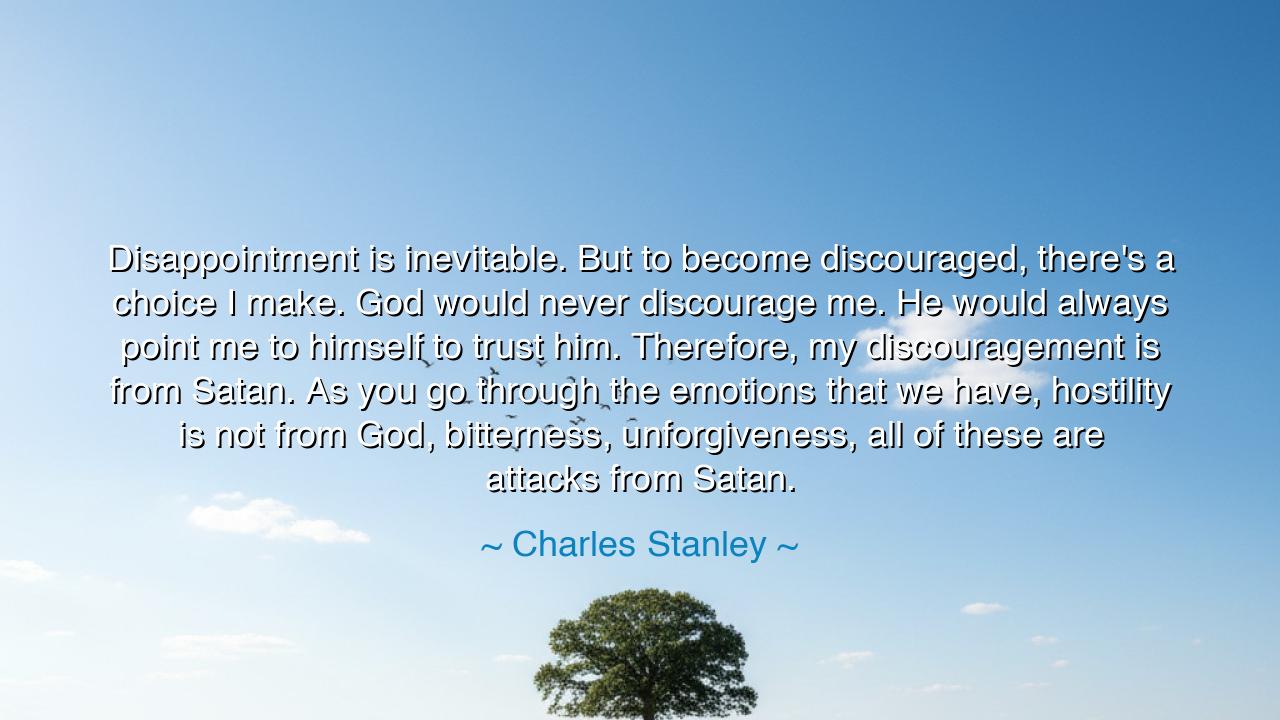
Disappointment is inevitable. But to become discouraged, there's
Disappointment is inevitable. But to become discouraged, there's a choice I make. God would never discourage me. He would always point me to himself to trust him. Therefore, my discouragement is from Satan. As you go through the emotions that we have, hostility is not from God, bitterness, unforgiveness, all of these are attacks from Satan.






“Disappointment is inevitable. But to become discouraged, there's a choice I make. God would never discourage me. He would always point me to Himself to trust Him. Therefore, my discouragement is from Satan. As you go through the emotions that we have, hostility is not from God, bitterness, unforgiveness, all of these are attacks from Satan.” — these words of Charles Stanley, spoken with the quiet authority of a man who walked deeply with God, are not merely pastoral advice, but the map of a spiritual battle. In them lies a wisdom as ancient as Job and as eternal as faith itself: that pain is unavoidable, but despair is optional. The storms will come, but what we do in the storm determines the shape of our souls.
The origin of this teaching flows from Stanley’s lifelong ministry of faith under pressure. As pastor, leader, and teacher, he faced trials that would have broken lesser men — betrayal, personal sorrow, seasons of loneliness, and public criticism. Yet he did not fall into despair. Through prayer, Scripture, and obedience, he discovered that while disappointment is part of life’s journey, discouragement is not a sentence — it is a temptation. The difference lies in the heart’s response. To be disappointed is to be human; to be discouraged is to lose sight of the divine. Thus, Stanley declares that God never discourages — for discouragement leads away from faith, and God always leads toward Himself.
At the center of this quote is a profound spiritual distinction: the emotions we feel are not always from God. Stanley names them — hostility, bitterness, unforgiveness — not as human flaws to be indulged, but as spiritual assaults to be resisted. In this, he echoes the wisdom of the ancients, who saw the heart as a battlefield where light and darkness contend. The Apostle Paul wrote of the same war, urging believers to “take every thought captive to obey Christ.” To Stanley, emotions are like passing clouds — they may darken the sky for a time, but they do not change the nature of the sun. The soul must learn to recognize the voice of the enemy, who whispers despair, division, and doubt, and to answer that voice not with surrender, but with trust in God.
History gives us living witnesses to this truth. Consider Corrie ten Boom, the Dutch woman who survived the horrors of a Nazi concentration camp. When her family was imprisoned for hiding Jews, she watched her sister die behind barbed wire. Yet in that crucible of suffering, she said, “There is no pit so deep that God’s love is not deeper still.” She faced disappointment beyond measure — the loss of freedom, of family, of innocence — yet she did not yield to discouragement. In her darkest hour, she learned what Stanley teaches: that God points the soul back to Himself, not through comfort, but through endurance. The devil may throw despair like a net, but faith tears it apart.
To say that discouragement is from Satan is to understand the subtle nature of spiritual warfare. The enemy rarely attacks with open destruction; he prefers the slow poison of despair. He whispers that we are alone, that we have failed, that God has forgotten us — and if we believe him, we sink. But Stanley reminds us that these thoughts are not divine. God convicts, but He never condemns; He tests, but He never abandons. His hand may lead us into the wilderness, but His heart always leads us home. Discouragement, then, is not simply an emotion — it is a deception. The soul must rise against it, wielding faith as a shield and trust as a sword.
In this way, Stanley’s teaching becomes both a warning and a call to courage. It tells us that the measure of our spiritual maturity lies not in the absence of pain, but in the presence of perseverance. The wise do not deny their feelings — they discern them. They ask, “Does this lead me toward God or away from Him?” The answer reveals the source. Hostility leads to division; bitterness to bondage; forgiveness to freedom. Each emotion is a choice, and in that choice, heaven and hell contend for the soul. To stand with God, one must learn to feel deeply, yet not be ruled by feeling — to acknowledge sorrow, yet not be consumed by it.
So, my child, take this teaching to heart: you will be disappointed, but you must not be defeated. When discouragement comes knocking, recognize it for what it is — not a messenger of God, but a thief of joy. Turn instead to prayer, to Scripture, to gratitude, and to trust. Speak the truth aloud when lies of despair arise: “My God has not abandoned me. His plans are good. His grace is sufficient.” For as Stanley reminds us, God always points us to Himself — and in His presence, discouragement dissolves.
Let your soul, then, be like a warrior in the field — aware that arrows will fly, but shielded by faith. When the tempter whispers bitterness, answer with blessing. When hostility burns within, quench it with forgiveness. When fear clouds the heart, light it with remembrance of God’s promises. For the path of the faithful is not without sorrow, but it is without defeat. Disappointment is inevitable — discouragement is a choice. Choose faith. Choose courage. Choose the God who never discourages, who forever lifts the weary heart back toward the light.






AAdministratorAdministrator
Welcome, honored guests. Please leave a comment, we will respond soon